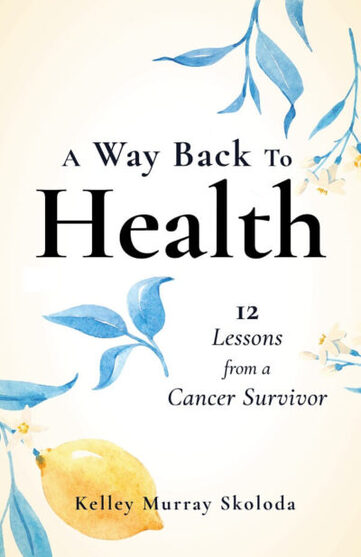Play & Book Excerpts
A Way Back to Health
(She Writes Press)
© Kelley Murray Skoloda
Learn to Trust Your Instincts and Prepare to Speak Up
Have your own experience and trust your intuition. A million people will tell you what you should and shouldn’t be doing, but you know yourself and your body best—do what you think is right.
—Christina Steinorth-Powell, cancer survivor and author
Throughout my journey with cancer, one of the most important and powerful lessons I learned is also one of the least tangible. While it’s a common saying, “trust your instincts” is much more easily said than done.
My instincts have always played a strong role in how I make decisions. When confronted with cancer, I was bombarded with so much emotion, information, and urgency that my instincts were more difficult to identify and access. When I did, however, they never failed me.
In a serious medical situation, it may sound heretical to trust your instincts more than you trust your doctors. After all, medical professionals are highly educated and know more than we do. Decisions are made based on facts and data that we, as regular people, know little about. Well, medical professionals may know more about medicine, and this is half the game, but they don’t know the most about you.
I called upon the power of instinct at the very beginning of my diagnosis, when I had a colonoscopy and later found out I had cancer and would need a colectomy. While the news struck me to my core, I also seemed to know in my heart that everything would be OK. It would have been easier (though none of this is easy!) to just go to the highly recommended local surgeon and move forward with the procedure. If I had not prepared a list of questions and then stepped back to realize I was not completely satisfied with the answers, I may have done just that. That feeling in my gut of not completely being satisfied with the surgeon’s answers nagged at me enough to get a second opinion. It would require more work and more time, both of which I didn’t feel I had much of. But I knew the extra time and effort was worth it for my health.
Speaking up is important, critically important. I was often frustrated that I was the only one who knew fully what my story and situation was. But patients are uniquely qualified to raise concerns about care because they are often the only one present for the full spectrum of care.
One month into my chemo regimen, I was in dire straits due to side effects, and I found it hard to speak up. Self-doubt about my condition, a significant loss of energy, not getting much of a reaction from the medical team, and not wanting to be a bother, all contributed to my reticence. But when I got to the point when my physical and mental ability to withstand treatment was fading, I had to find the strength to save myself. It’s crazy that I had to get to such a breaking point before pressing harder to get a response from my doctor.
Don’t let yourself get to this point. If things don’t seem right to you, then they aren’t. Speak up for yourself, even if you feel like you are being a pain. Find the strength to speak up for yourself before you lose your strength altogether.
5 Ways to Take Action on Trusting Your Instincts and Speaking Up
Find Quiet Time and Still Your Mind
When faced with an anxiety-laden situation, many of us seek answers online or from doctors, friends, and anyone who has an opinion. While it requires some discipline, I found twenty minutes of quiet time a day more helpful than all the noise. In that quiet time, I focused on what I really wanted—to be healthy—and deep breathing.
Own Your Advocacy
No one knows what you know about what you are feeling and going through like you do. Do for yourself what you would do for your child—ask questions, get answers, press on if needed, and don’t ever feel bad about owning your advocacy.
Take Notes
One of the ways I was able to advocate for myself was by keeping a running notebook of everything that happened to me—doctors’ visits, questions, symptoms, medications—anything related to my healthcare. My notebook became my non-electronic medical record and often proved to be more reliable than the electronic healthcare records kept by the doctors. I always had my notes, dates, and questions in one place and could easily refer back to them.
Bring the Same Person with You to Critical Appointments
My husband and often my mom accompanied me on the most important doctors’ appointments and treatments, especially when I was in an emotional or weakened state. They listened and asked questions, too. Having them in the room provided comfort to me, and they served as an extra set of ears and eyes. Though I was sometimes too numb to ask anything other than the questions I had prepared in my notebook, they were helpful in being more responsive and reactive in the moment as well as serving as sounding boards after an appointment.
Give Thanks
What am I grateful for today? It ranges from the physical to the emotional and everything in between: perfect health, a full house, a loving husband, great kids, a wonderful family, meaningful work, great clients, abundance, and my cats are included every day. My gratitude somehow seems to reinforce my instincts and let me focus on what is most important.
—Christina Steinorth-Powell, cancer survivor and author
Throughout my journey with cancer, one of the most important and powerful lessons I learned is also one of the least tangible. While it’s a common saying, “trust your instincts” is much more easily said than done.
My instincts have always played a strong role in how I make decisions. When confronted with cancer, I was bombarded with so much emotion, information, and urgency that my instincts were more difficult to identify and access. When I did, however, they never failed me.
In a serious medical situation, it may sound heretical to trust your instincts more than you trust your doctors. After all, medical professionals are highly educated and know more than we do. Decisions are made based on facts and data that we, as regular people, know little about. Well, medical professionals may know more about medicine, and this is half the game, but they don’t know the most about you.
I called upon the power of instinct at the very beginning of my diagnosis, when I had a colonoscopy and later found out I had cancer and would need a colectomy. While the news struck me to my core, I also seemed to know in my heart that everything would be OK. It would have been easier (though none of this is easy!) to just go to the highly recommended local surgeon and move forward with the procedure. If I had not prepared a list of questions and then stepped back to realize I was not completely satisfied with the answers, I may have done just that. That feeling in my gut of not completely being satisfied with the surgeon’s answers nagged at me enough to get a second opinion. It would require more work and more time, both of which I didn’t feel I had much of. But I knew the extra time and effort was worth it for my health.
Speaking up is important, critically important. I was often frustrated that I was the only one who knew fully what my story and situation was. But patients are uniquely qualified to raise concerns about care because they are often the only one present for the full spectrum of care.
One month into my chemo regimen, I was in dire straits due to side effects, and I found it hard to speak up. Self-doubt about my condition, a significant loss of energy, not getting much of a reaction from the medical team, and not wanting to be a bother, all contributed to my reticence. But when I got to the point when my physical and mental ability to withstand treatment was fading, I had to find the strength to save myself. It’s crazy that I had to get to such a breaking point before pressing harder to get a response from my doctor.
Don’t let yourself get to this point. If things don’t seem right to you, then they aren’t. Speak up for yourself, even if you feel like you are being a pain. Find the strength to speak up for yourself before you lose your strength altogether.
5 Ways to Take Action on Trusting Your Instincts and Speaking Up
Find Quiet Time and Still Your Mind
When faced with an anxiety-laden situation, many of us seek answers online or from doctors, friends, and anyone who has an opinion. While it requires some discipline, I found twenty minutes of quiet time a day more helpful than all the noise. In that quiet time, I focused on what I really wanted—to be healthy—and deep breathing.
Own Your Advocacy
No one knows what you know about what you are feeling and going through like you do. Do for yourself what you would do for your child—ask questions, get answers, press on if needed, and don’t ever feel bad about owning your advocacy.
Take Notes
One of the ways I was able to advocate for myself was by keeping a running notebook of everything that happened to me—doctors’ visits, questions, symptoms, medications—anything related to my healthcare. My notebook became my non-electronic medical record and often proved to be more reliable than the electronic healthcare records kept by the doctors. I always had my notes, dates, and questions in one place and could easily refer back to them.
Bring the Same Person with You to Critical Appointments
My husband and often my mom accompanied me on the most important doctors’ appointments and treatments, especially when I was in an emotional or weakened state. They listened and asked questions, too. Having them in the room provided comfort to me, and they served as an extra set of ears and eyes. Though I was sometimes too numb to ask anything other than the questions I had prepared in my notebook, they were helpful in being more responsive and reactive in the moment as well as serving as sounding boards after an appointment.
Give Thanks
What am I grateful for today? It ranges from the physical to the emotional and everything in between: perfect health, a full house, a loving husband, great kids, a wonderful family, meaningful work, great clients, abundance, and my cats are included every day. My gratitude somehow seems to reinforce my instincts and let me focus on what is most important.
|
Kelley Skoloda is a wife, mom, daughter, sister, aunt, author and MBA. She is also the founder and CEO of KS Consulting & Capital and, now, a cancer survivor.
Kelley is a recognized authority on consumer brand marketing whose business book, Too Busy to Shop: Marketing to Multi-Minding Women, was named a “must read” by Publishers Weekly. As co-chair of the investment committee of the Next Act Fund, she invests in female-led startup companies. She has been named one of the “most influential women in business” by the Pittsburgh Post-Gazette and serves on several boards of directors. She has been quoted in HuffPo, Time.com, TODAY.com, Fortune.com, Forbes, Adweek, BRANDWEEK, C-SPAN, and many other media outlets. Kelley’s family is the center of her life and she loves to golf, cook, travel, and enjoy cat humor with them. She is grateful every day for the love and support she received throughout her health challenges and hopes her story can be helpful to others navigating cancer. |




